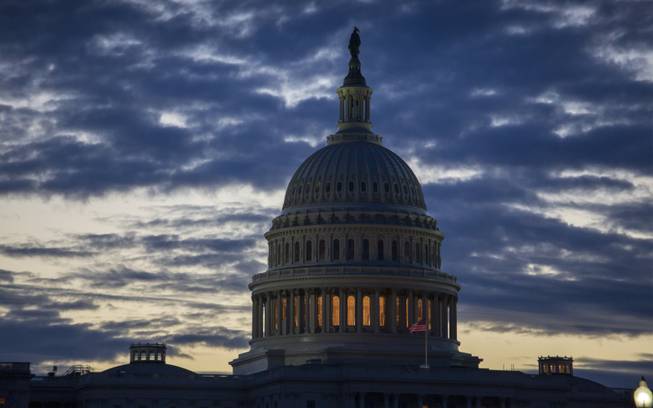
J. Scott Applewhite / AP
In this Jan. 8, 2019, photo, dawn arrives at the Capitol in Washington.
Tuesday, Sept. 3, 2019 | 7 p.m.
On the day after Labor Day, congressional Nevada Democrats told union members and leadership they will keep pushing for labor-related bills to be brought up in the Senate, despite ongoing Republican animus toward bringing up many left-leaning issues in Congress’ upper chamber.
Reps. Dina Titus, Susie Lee, and Steven Horsford spoke at an American Federation of Labor and Congress of Industrial Organizations gathering Tuesday, detailing labor-related legislation backed by the Democratic-controlled House and criticizing Senate Majority Leader Mitch McConnell, R-Kentucky, by echoing other Democrats’ description of the Senate as a “legislative graveyard.”
Titus, the dean of Nevada’s delegation, said that McConnell could be pushed toward taking up some of the issues by senators who are more vulnerable in the 2020 elections. Sens. Susan Collins, R-Maine, and Cory Gardner, R-Colorado, are widely seen as Democratic targets going into the next election cycle.
“I think we have to keep pushing them out there because it says to the public this is our agenda and we’re working hard,” Titus said. “Also, it puts him on the spot. He’s got some vulnerable senators there who are up for election like in Maine and in Colorado, so they may pressure him to vote for it. And it also sets the agenda for the presidential election.”
Lee, who is serving her first term in Congress, said she was surprised by certain actions in Washington, including the back-and-forth around the fiduciary rule, which essentially required investors to put the interests of their customers over their own. The rule was thrown out by a circuit court judge last year, but the Trump administration is currently working on another version of the rule that has yet to be unveiled.
“As the freshman in this group, one of the things that has been most surprising to me is the insidious, under-the-radar things that happen in Washington, especially within the Department of Labor, that continue to threaten the livelihood of working Americans,” she said.
Horsford said that Republicans in the Senate will have to consider bills sent to them by the House, or the House will freeze legislation in its own right.
“Mitch McConnell doesn’t want to act, but guess what? They’re going to need some stuff passed on their side, and we’ve told our leadership that unless certain bills that we want get done, we’re not voting for some of their crap,” he said. “So that’s the way the deal’s going to have to go down. Quote me on ‘crap.’”
Legislation the lawmakers discussed at the union event included:
The Butch Lewis Act would create a loan program to allow failing pension plans to borrow money to reinvigorate the plan. The legislation would create the Pension Rehabilitation Administration within the Treasury Department, which would sell bonds on the open market and loan the money from the sales to pension plans.
“As you know, union members and retirees draw from multi-employer pension funds, that’s because many tradespeople work for different employers over the years,” Lee said. “Some of these employers have faced tough times and the pensions have taken the hits now as well, which is why the Butch Lewis Act is so important to pass.”
The Middle Class Health Benefits Tax Repeal Act would repeal the Affordable Care Act’s excise tax portion. Currently, according to the Tax Foundation, the ACA would require a 40% excise tax on employer-sponsored health insurance that exceeds $11,200 for an individual and $30,150 for a family starting in 2022.
The rollout of the excise tax — or “Cadillac tax" — has been delayed on multiple occasions. If it goes into effect, health insurance providers will have to pay the 40% tax on the amount above the set rates.
Horsford said the Nevada delegation fought “tooth and nail” for the bill.
“We sponsored the bill. We debated it in Ways and Means (Committee). We brought it to the floor, and it passed,” Horsford said.
The Paycheck Fairness Act is aimed at closing the gender pay gap. Currently, according to the Institute for Women’s Policy Research, women make around 80.5 cents for every $1 earned by men. The pay gap is wider for women of color.
The act would build on the Equal Pay Act of 1963 by, among other things, making it illegal for employers to retaliate if workers discuss pay with each other, requiring employers to prove the reason for pay disparities is job-related and make employers unable to use past salary history in screening practices.
The Raise the Wage Act would incrementally raise the minimum wage to $15 an hour by 2025. According to a study by the Economic Policy Institute and cited by the House Education and Labor Committee, raising the minimum wage to $15 an hour would lift wages for 33.5 million workers.
